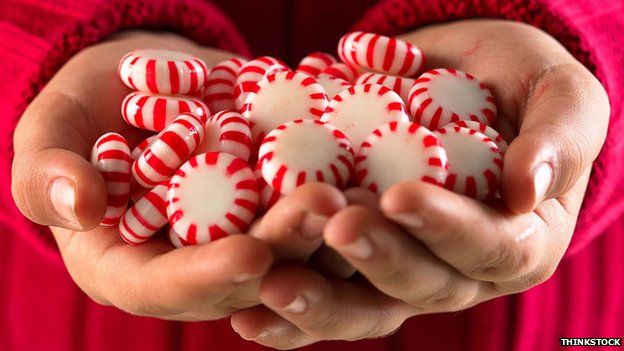Row over sugar firms' links to scientists
- Published

A row has erupted about links between the sugar industry and scientists who advise government on obesity.
Campaigners argue the scientists are so heavily influenced by companies that Dracula is now "in charge of the blood bank".
The scientists concerned say it is wrong to assume they are biased and critics should "learn proper science".
Public Health England said it welcomed industry "listening to our best scientists".
The argument was sparked by a report on the issue in the British Medical Journal.
It claims Prof Susan Jebb - the government's obesity tsar, a University of Oxford academic and an expert in a recent three-part BBC documentary series on obesity - has attracted more than £1.3m of industry funding.
This includes money from Coca-Cola, Unilever and Cereal Partners.
The article says members of a government advisory panel - the Scientific Advisory Committee on Nutrition (SACN) - are supported by companies such as PepsiCo, Mars and Nestle.
It also claims that of the 40 scientists affiliated with SACN between 2001 and 2012, just 13 had no connections to the sugar industry.
BMJ editor-in-chief Fiona Godlee said the investigation showed there was a "network of relationships between key public health experts and the sugar industry".
She said "these sorts of links create bias" and "weaken public health efforts to tackle the harmful effects of sugar on the diet".
Dracula
Prof Simon Capewell, from the University of Liverpool and an adviser for the group Action on Sugar, told the BBC: "I was shocked, quite honestly; this is heart-breaking news and basically it appears a lot of people have been seriously misled."
He said there would be an "inherent conflict of interest" between profits and public health.
"It's like putting Dracula in charge of the blood bank," he concluded.
But that is an "insult", "fundamentally wrong" and shows a "need to learn some proper science" according to Prof Ian MacDonald, who led a review of sugar guidelines last year.
The draft report, by SACN, said sugar added to food or naturally present in fruit juice and honey should account for 5% of energy intake - half the current recommendation.
He said the committee was clearly not biased as "that draft report is tougher on sugar than the World Health Organization report is, or any other report is".
He told the BBC News website he was "not embarrassed" at advising industry, but acknowledged the general public was "very sceptical".
"We're world-respected scientists whose opinions are provided to government and to industry; and those people use that information as they see fit," he said.
'Makes sense'
Prof Jebb defended her record, telling the BBC: "As a scientist my independence and personal credibility are crucial to me. Moreover, everything I do is aimed at improving public health."
She said there were times when it "makes good sense" to work with industry.
She cited one project funded by Coca-Cola that proved its product was ineffective as an aid to weight loss.
"If a company has genuine reason to believe their product or ingredient or programme works then it seems appropriate to me that they should fund a trial to prove it, ideally conducted by independent scientists," she added.
A spokesperson for SACN, in a statement issued through Public Health England, said: "We welcome that industry is listening to our best scientists who can tell them what harm sugar is doing to the nation's health."
Prof Jebb used to run the Medical Research Council's Human Nutrition Research unit.
Dr Frances Rawle, the head of policy at the Medical Research Council, said: "We ensure that all research we fund is free of any influence from those with whom we collaborate, be they a charity or a commercial organisation.
"We actively encourage researchers to work with industry and, where it's appropriate, we jointly fund many projects with industry partners or provide independent scientific expertise.
"Nutrition research is a good example because working with food and diet industry can help to directly translate high quality research into public health benefit."
- Published26 June 2014
- Published26 June 2014
- Published26 June 2014